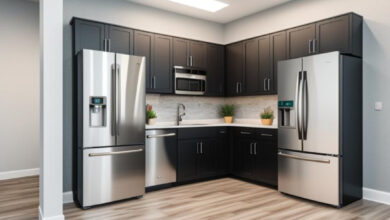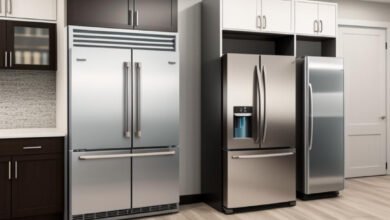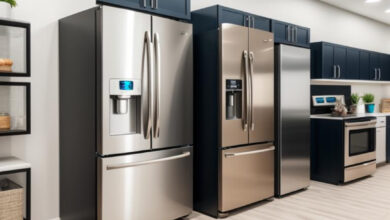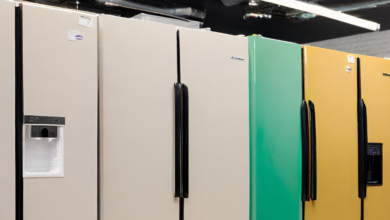Low-Power Consumption Refrigerators: A Comprehensive Guide to Energy-Efficient Cooling Solutions
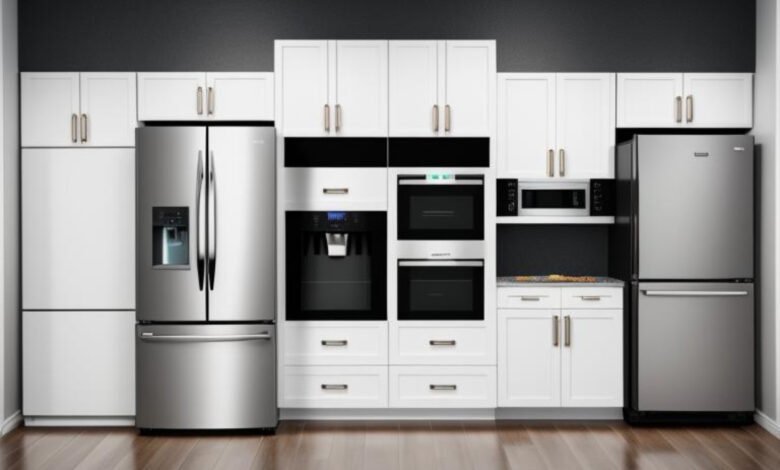
In the pursuit of sustainable living and reduced energy costs, the choice of household appliances plays a pivotal role. Among these, the refrigerator stands out as a significant contributor to energy consumption. In this extensive guide, we will explore the realm of low-power consumption refrigerators, understanding their importance, delving into innovative technologies, and highlighting top models from leading brands. By the end of this guide, you’ll be equipped with the knowledge to make informed decisions for an energy-efficient and eco-friendly kitchen.
Understanding the Significance of Low-Power Consumption Refrigerators
Refrigerators are indispensable in modern homes, ensuring the preservation of perishable food items. However, the energy they consume can be substantial. Here’s why low-power consumption refrigerators are gaining prominence:
1. Reduced Environmental Impact:
Low-power consumption refrigerators contribute to environmental conservation by minimizing energy usage. This directly translates to a reduction in greenhouse gas emissions, mitigating the ecological footprint.
2. Economical Operation:
Choosing a low-power consumption refrigerator translates to lower electricity bills. These appliances are designed to optimize energy usage, resulting in long-term savings for homeowners.
3. Sustainable Living:
Embracing low-power consumption appliances aligns with the principles of sustainable living. It reflects a commitment to responsible resource usage and a desire to contribute to a greener future.
4. Technological Advancements:
Innovations in refrigerator technology have led to the development of energy-efficient models. These advancements include inverter compressors, smart temperature control, and improved insulation materials.
Exploring Innovative Technologies in Low-Power Consumption Refrigerators
Modern low-power consumption refrigerators incorporate cutting-edge technologies that go beyond traditional cooling methods. Let’s delve into some of these innovations:
1. Inverter Compressors:
Inverter compressors adjust their speed based on cooling demands, ensuring a more consistent temperature while reducing energy consumption. This technology is a hallmark of many low-power consumption refrigerators.
2. Triple Cooling Systems:
Some advanced models feature triple cooling systems that independently control the temperature in the refrigerator and freezer compartments. This not only optimizes energy usage but also helps preserve food freshness.
3. Smart Temperature Control:
Smart temperature control systems utilize sensors to monitor and adjust the internal temperature based on the contents of the refrigerator. This ensures optimal conditions for food storage while minimizing unnecessary energy consumption.
4. Vacuum Insulation Panels:
Innovative insulation materials, such as vacuum insulation panels, enhance thermal efficiency. These panels offer superior insulation properties compared to traditional materials, reducing the workload on the refrigerator’s cooling system.
5. Solar-Powered Refrigerators:
Some low-power consumption refrigerators incorporate solar panels to harness renewable energy. These models are particularly suitable for regions with ample sunlight, offering a sustainable and eco-friendly cooling solution.
Top Low-Power Consumption Refrigerators: Leading the Way in Energy Efficiency
Let’s explore some of the top low-power consumption refrigerators available in the market. These models are recognized for their energy-efficient features, technological innovations, and commitment to sustainable cooling:
1. LG Linear Top Freezer Refrigerator
Overview:
LG’s Linear Top Freezer Refrigerator is designed with energy efficiency in mind. The linear compressor adjusts its speed for precise cooling, minimizing energy consumption.
Key Features:
- Linear Compressor: Adjusts speed based on cooling demands, reducing energy usage.
- Smart Diagnosis™: Allows for quick and easy troubleshooting, enhancing overall efficiency.
2. Samsung Convertible French Door Refrigerator
Overview:
Samsung’s Convertible French Door Refrigerator offers flexibility and energy efficiency. Its digital inverter compressor adjusts its speed to optimize cooling and minimize power consumption.
Key Features:
- Digital Inverter Compressor: Adjusts speed for efficient and quiet operation.
- Convertible Flex Zone: Adaptable storage space for various food items.
3. Whirlpool Bottom Freezer Refrigerator with Adaptive Defrost
Overview:
Whirlpool’s Bottom Freezer Refrigerator with Adaptive Defrost is designed for energy-efficient and precise temperature control, ensuring optimal freshness.
Key Features:
- Adaptive Defrost: Reduces energy consumption by defrosting only when necessary.
- Accu-Chill™ Temperature Management System: Maintains consistent temperatures for efficient cooling.
4. GE Appliances Top-Freezer Refrigerator with LED Lighting
Overview:
GE Appliances offers a Top-Freezer Refrigerator with LED lighting and energy-efficient features. The upfront cost is balanced by long-term energy savings.
Key Features:
- LED Lighting: Efficient illumination with minimal energy consumption.
- Eco-Friendly Insulation: Utilizes sustainable insulation materials.
5. Bosch 800 Series French Door Refrigerator
Overview:
Bosch’s 800 Series French Door Refrigerator combines sleek design with energy-efficient performance. The VitaFreshPro™ technology helps maintain optimal temperature and humidity levels.
Key Features:
- VitaFreshPro™ Technology: Preserves food freshness by optimizing temperature and humidity.
- Energy Star Certification: Meets strict energy efficiency standards.
6. KitchenAid Counter-Depth Side-by-Side Refrigerator
Overview:
KitchenAid’s Counter-Depth Side-by-Side Refrigerator combines elegance with energy efficiency. The Preserva® Food Care System ensures optimal storage conditions.
Key Features:
- Preserva® Food Care System: Dual evaporators for precise temperature and humidity control.
- LED Lighting: Efficient illumination with minimal energy consumption.
Choosing the Right Low-Power Consumption Refrigerator: A Buyer’s Guide
Selecting a low-power consumption refrigerator involves considering several factors to ensure it meets your energy efficiency goals. Here’s a comprehensive buyer’s guide to assist you in making an informed decision:
1. Energy Star Certification:
Look for the Energy Star label, indicating that the refrigerator meets or exceeds strict energy efficiency guidelines set by the Environmental Protection Agency (EPA).
2. Inverter Compressors:
Prioritize models with inverter compressors for their ability to adjust speed based on cooling demands, providing energy savings and consistent temperatures.
3. Size and Layout:
Choose a refrigerator size and layout that aligns with your household needs. A well-sized refrigerator ensures efficient cooling without unnecessary energy consumption.
4. Advanced Insulation:
Check for models with advanced insulation materials, such as vacuum insulation panels, to enhance thermal efficiency and reduce energy consumption.
5. Temperature Control Systems:
Opt for refrigerators with smart temperature control systems that adjust internal temperatures based on the contents, minimizing unnecessary energy usage.
6. Convertible Features:
Consider models with convertible features that allow you to adapt storage space based on your needs. This flexibility contributes to efficient energy usage.
7. User Reviews:
Read user reviews to gain insights into the real-world energy efficiency and performance of the refrigerator model you are considering.
Conclusion
In the quest for sustainable and energy-efficient living, choosing a low-power consumption refrigerator is a pivotal step. The models highlighted in this guide, including those from LG, Samsung, Whirlpool, GE Appliances, Bosch, and KitchenAid, showcase a range
of features and designs that cater to different preferences and needs.
By understanding the significance of low-power consumption refrigerators, exploring innovative technologies, and considering key factors when making a purchase, you can make a conscious choice that not only enhances your kitchen but also contributes to a more sustainable lifestyle. As manufacturers continue to innovate, the landscape of low-power consumption appliances is expected to evolve, providing even more options for environmentally conscious consumers.
